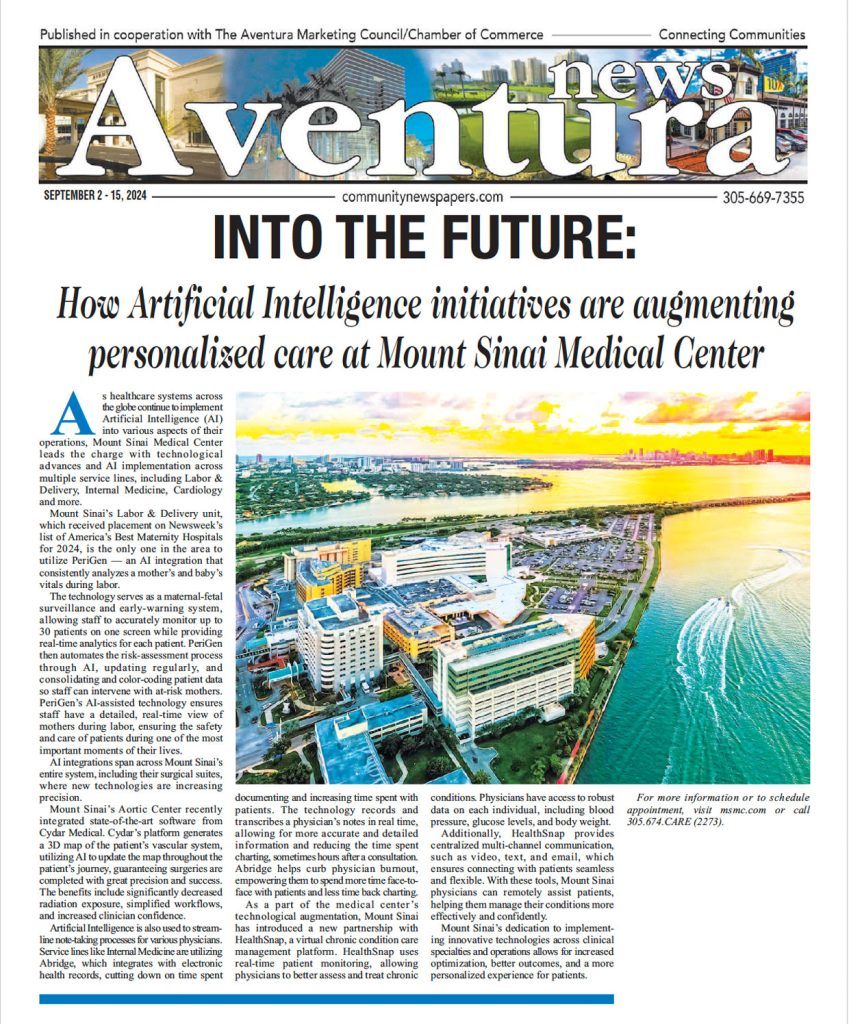Into the Future: How Artificial Intelligence initiatives are augmenting personalized care at Mount Sinai Medical Center

As healthcare systems across the globe continue to implement Artificial Intelligence (AI) into various aspects of their operations, Mount Sinai Medical Center leads the charge with technological advances and AI implementation across multiple service lines, including Labor & Delivery, Internal Medicine, Cardiology and more.
Mount Sinai’s Labor & Delivery unit, which received placement on Newsweek’s list of America’s Best Maternity Hospitals for 2024, is the only one in the area to utilize PeriGen — an AI integration that consistently analyzes a mother’s and baby’s vitals during labor.
The technology serves as a maternal-fetal surveillance and early-warning system, allowing staff to accurately monitor up to 30 patients on one screen while providing real-time analytics for each patient. PeriGen then automates the risk-assessment process through AI, updating regularly, and consolidating and color-coding patient data so staff can intervene with at-risk mothers. PeriGen’s AI-assisted technology ensures staff have a detailed, real-time view of mothers during labor, ensuring the safety and care of patients during one of the most important moments of their lives.
AI integrations span across Mount Sinai’s entire system, including their surgical suites, where new technologies are increasing precision. Mount Sinai’s Aortic Center recently integrated state-of-the-art software from Cydar Medical. Cydar’s platform generates a 3D map of the patient’s vascular system, utilizing AI to update the map throughout the patient’s journey, guaranteeing surgeries are completed with great precision and success. The benefits include significantly decreased radiation exposure, simplified workflows, and increased clinician confidence.
Artificial Intelligence is also used to streamline note-taking processes for various physicians. Service lines like Internal Medicine are utilizing Abridge, which integrates with electronic health records, cutting down on time spent documenting and increasing time spent with patients. The technology records and transcribes a physician’s notes in real time, allowing for more accurate and detailed information and reducing the time spent charting, sometimes hours after a consultation. Abridge helps curb physician burnout, empowering them to spend more time face-toface with patients and less time back charting.
As a part of the medical center’s technological augmentation, Mount Sinai has introduced a new partnership with HealthSnap, a virtual chronic condition care management platform. HealthSnap uses real-time patient monitoring, allowing physicians to better assess and treat chronic conditions. Physicians have access to robust data on each individual, including blood pressure, glucose levels, and body weight.
Additionally, HealthSnap provides centralized multi-channel communication, such as video, text, and email, which ensures connecting with patients seamless and flexible. With these tools, Mount Sinai physicians can remotely assist patients, helping them manage their conditions more effectively and confidently.
Mount Sinai’s dedication to implementing innovative technologies across clinical specialties and operations allows for increased optimization, better outcomes, and a more personalized experience for patients.

